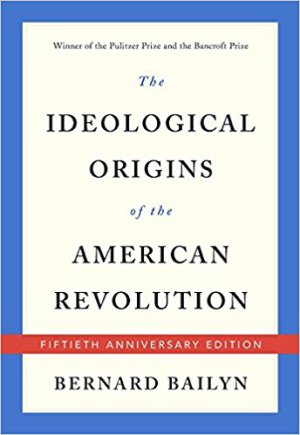
On the occasion of the fiftieth anniversary of the publication of Bernard Bailyn’s The Ideological Origins of the American Revolution, Peter Mancall of the USC-Huntington Early Modern Studies Institute and Steve Pincus of Yale University’s Center for Historical Enquiry & the Social Sciences, organized a conference to reappraise this groundbreaking work. The conference brought together important scholars of the American Revolution, many of whom were former students of Professor Bailyn. The following is a report of the two-day event held on April 20-21, 2017.
When The Ideological Origins of the American Revolution was first published, the role of ideas in understanding the momentous events of the 1770s and 1780s, were not central to historical writing on the subject. Instead, as is widely known to students of American historiography, progressive interpretations stressing the role of interests, especially economic ones, and the consensus school, highlighting the distinctively American and conservative character of the Revolution, dominated debate. Bailyn’s work set the scene for a fundamental departure in the historiographical landscape. Perhaps as a response to the sway Marxist theory held over American progressive interpretations, or as an early instance of what came to be known as the ‘linguistic turn’, Bailyn’s use of the term ‘ideology’ expressed his view of ideas as sincere expressions of belief motivating action, rather than the rationalization of interest, or expedient propaganda. He provided a brilliant analysis of how intellectual reception, the interior life of the mind and emotions, could translate into revolutionary action.
Several distinct themes emerged over the course of the two-day event that aimed to examine the signature contribution Bailyn made to our understanding of the Revolution. First, Eric Slauter placed Bailyn in his historiographical milieu. The influence of Caroline Robbins and J.G.A. Pocock on Bailyn’s interpretation of radical whig thought are well-known. But it was his reading of the work of lesser known American literary scholars, which provided the impetus for Bailyn’s study of words and their changing meaning as a symptom of shifts in political culture and understanding. By adopting this strategy, drawn from the work of Moses Coit Tyler, Elizabeth C. Cook, and Perry Miller, Bailyn was able to provide an interior view of the revolutionary generation and an intimate excavation of its mentalite.
Originally published as an introduction to an edition of revolutionary pamphlets, entitled The Transforming Radicalism of the American Revolution, Bailyn’s work, together with the companion volume The Origins of American Politics, provided a periodization or intellectual chronology of the rise of revolutionary consciousness. In this way, Jack Rakove’s paper recalled his experience of teaching Bailyn’s text and how its pedagogical function served to underline key questions of causation, an analytic at odds with the dominant trend of histories of the last decade which have focused on the lived experience of the Revolution. Rakove described Bailyn’s text as providing two distinct modes of explanation for the Revolution. The first provided an account of the causes of the Revolution under the influence of a worldview, or ideology, which pushed Americans from fear and suspicion at the loss of liberties, to outright resistance, and finally revolution against the threat posed to liberty by Britain’s expanding imperial state. The other, faced only after Independence had been declared, involved the eclipse of ideology in place of debate over key political and social questions, including slavery, religious freedom, and democratic rights. The specific role played by Whig ideology could not provide the answers for constituting a new and powerful national government, especially since—as Bailyn made clear—the suspicion of governmental power was the cornerstone of radical Whig thought.
The transition therefore from colonies to separate states, was a mere preamble to a much larger transformation in the structure of politics, where the nation-state produced out of the ashes of revolutionary separation required some new conception of sovereignty capable of holding a union of states, each highly jealous of their liberty. Danielle Allen provided a compelling account of the thought of James Wilson, who was shown to have nurtured an account of unitary sovereignty based on the new American nation as far back as the Declaration. Equally, Daniel Hulsebosch’s paper made clear that the constitution of 1787 was also a product of the international legal dimensions of governance, in which commercial and financial obligations structured the process of constitution making despite contradicting imperatives of domestic politics. Across the Atlantic, debates over sovereignty were being fought out in the France in a similarly ideological vein. As Patrice Higgonet discussed, the work of Francois Furet a decade later, and the guiding emphasis his work placed on ideas and their expression in public life, led to the convergence of historiographical concerns in French and American history. But for Higgonet, Bailyn’s account of the ‘pragmatic idealism’ of the American style of national governance was fundamentally at odds with the radicalism of the French. Indeed, such a contrast recalls Hannah Arednt’s famous distinction between the political and social bases of revolutionary thought.
Colin Kidd’s presentation provided some useful historiographical context for the foregoing discussions. The focus on the nation-state as the unit of analysis for understanding the structural transformations of American politics during and after the Revolution has been complicated in recent years by the resurgence of imperial and global histories. The early modern experience of Europe’s composite states with heterogenous populations and overseas territories has cast serious doubt on a smooth transition from the world of early modern empire to modern nation-states, absent of the vestiges of empire. Kidd tied this to Bailyn’s original emphasis on the ideological attachment to liberty secured by a mixed constitution as the defining characteristic of free states, struggling to maintain their rights and freedoms against the encroachments of large imperial monarchies. The eighteenth century was understood to be an inauspicious time for free states, as examples abounded of the decline of liberty and the rise of absolute monarchies. This aspect of the ideological context in eighteenth-century colonial America was strongly connected to a spatial and temporal sensibility. Commonwealth ideology, found in such popular works as Cato’s Letters and Robert Molesworth’s An Account of Denmark, derived from a variety of sources whose authors looked beyond the example England to the fate of other free states with mixed constitutions and parliamentary governments. They looked back in time to the Greek and Roman classical republics, and to the contemporary Dutch and Swiss republics and northern European monarchies. But more surprisingly perhaps, American readers took from these Whig sources a more wide-ranging view of the conditions of politics in eastern Europe and Russia, and beyond to the Middle East, Africa, and Asia. By framing their deeply pessimistic views on the prospects of liberty’s survival with reference to these more far-flung societies, the colonists found in them apparently despotic forms of government, providing an ultimate contrast with their own Christian civilization and Gothic constitutional freedoms. As Kidd explained therefore, Bailyn’s account of radical whig thought contained within it the faint beginnings of a global perspective and its role in the formation of political ideology, long before global history became popular.
So what of ideology and its relationship to the fields of intellectual history and political thought, (both fields Bailyn helped to firmly establish)? Eric Nelson and Gordon Wood’s papers provided some definitional clarity. Nelson distinguished between ideology understood as political consciousness, and political theory, understood as the individual components and ideas comprising political argument. The distinction in Nelson’s mind was key to unlocking key historiographical disjunctures present at the time of the Revolution. Wood explored the relationship between ideas and the social or material conditions upon which they feed or interact, noting the extent to which historians unhelpfully still view ideas and material conditions as distinct.. Wood noted the persistence of Progressive critiques of Bailyn’s account, which uphold the dichotomy between interests and ideas or economics and ideology. Such arguments rested on a far too simplistic view of human nature and epistemology. Instead, Wood highlighted the problem with Bailyn’s account of the formation of a new national government, under apparent conditions of minimal social conflict and as an essentially natural development of the ideas and aspirations motivating independence. Social and political conflict was a far greater feature of these years in Wood’s account. It was the rising middling sort with their desire for political and economic change which prompted the ideological struggles over the conditions of constitution making, including attempts to prevent the issuing of credit instruments like paper money by state legislatures. These social conflicts could be mapped onto the ideological dimensions of the early Republic, understood at the time as a clash between aristocracy and democracy, words which Wood argued carried a crucial meaning at the time, and to which he urged historians pay greater attention.
Bailyn himself gave a keynote lecture in which he reflected on the emphasis of his original argument, highlighting above all his focus on the American obsession with the dynamics of power and its corrupting tendencies for political liberties and the institutions of government. Such considerations recall Bailyn’s masterful account of the rise of conspiratorial thought in the American colonies. Given the very real consequences of the conspiratorial mindset on American political culture today, Bailyn’s work reminds us, in a different context, that the plausibility or veracity of political arguments does not always matter in determining their influence.
E.G. Gallwey is a Ph.D. student in History at Harvard University, currently writing a dissertation which explores the intellectual history of political economy in early America and the early modern Atlantic world.
Share this:






